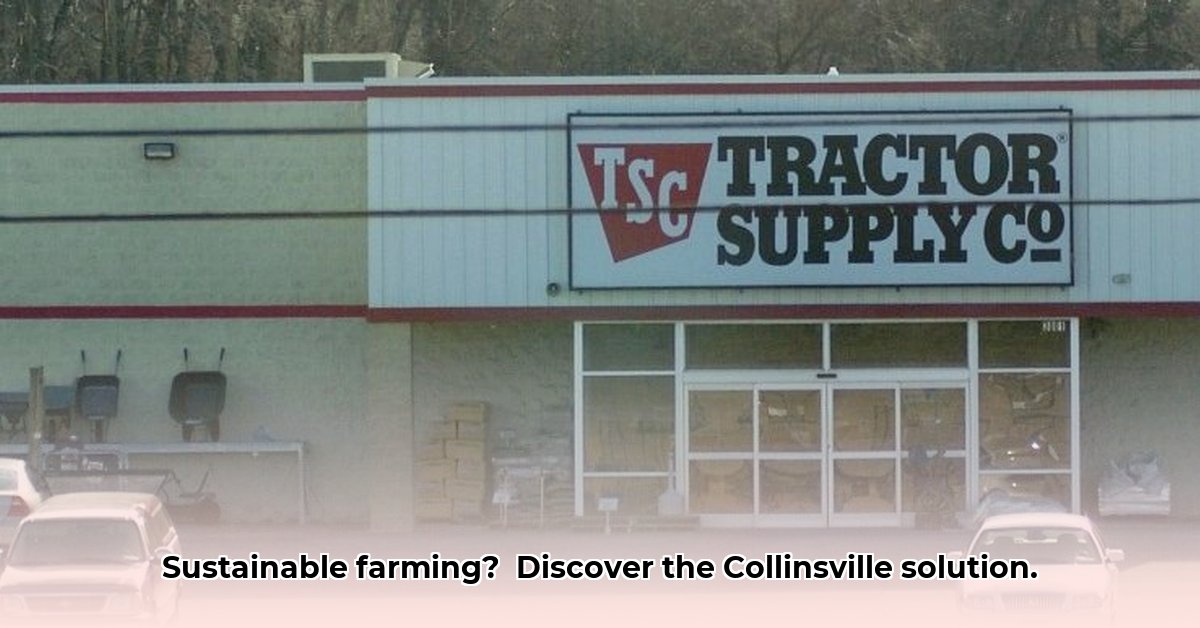
Collinsville Tractor Supply (CTS) plays a significant, though often unquantified, role in supporting sustainable agriculture within its community. While comprehensive data on its overall impact is lacking, examining its product offerings and stakeholder perspectives reveals its potential contribution to greener farming practices. This article explores CTS's role as a case study, highlighting both its positive aspects and areas needing improvement. For more information on a similar Tractor Supply location, check out this Collierville store.
CTS's Product Offerings for Sustainable Agriculture
CTS offers a range of products beneficial to sustainable farming and gardening. For livestock farmers, this includes sustainable feed options designed to enhance animal health and minimize the environmental impact of animal agriculture. For gardeners, the store provides organic seeds, water-efficient tools, and soil amendments that improve soil health without harmful chemicals. Additionally, CTS stocks water management solutions such as drip irrigation systems and rain barrels, promoting water conservation—a critical element of sustainable farming. These products, readily available to the community, make sustainable practices more accessible. How many farmers are actually using these products for sustainable practices is not, however, tracked by the company.
Assessing the Impact: A Community Perspective
While the benefits of CTS's product offerings are evident to local farmers and gardeners, precisely measuring its total contribution to sustainable agriculture presents a challenge. A lack of comprehensive data on the sales of sustainable products versus conventional ones prevents a definitive assessment of its overall environmental impact. However, the store's influence on the community is undeniable. A small farmer's adoption of a water-efficient irrigation system, for example, translates to significant water savings annually. Multiplied across multiple farms, these individual actions contribute to substantial community-wide water conservation. Similarly, the use of organic soil amendments improves local soil health, boosting biodiversity and reducing reliance on harmful pesticides. While precise figures are unavailable, the positive impact on a community level is clear.
Stakeholder Perspectives and Actionable Steps
The success of sustainable agriculture hinges on collaboration among different stakeholders. Each plays a crucial role, and their efforts must be aligned to maximize the impact.
| Stakeholder | Short-Term Benefits | Long-Term Goals and Actions |
|---|---|---|
| Small-Scale Farmers | Access to sustainable farming supplies. | Adopting more diverse eco-friendly practices; actively seeking educational resources and support; advocating for policies that promote sustainable agriculture. |
| Collinsville Tractor Supply | Increased sales of sustainable products; enhanced brand reputation. | Expanding sustainable product offerings; investing in staff training on sustainable agriculture; publishing regular sustainability reports; conducting supply chain assessments to improve sustainability. |
| Consumers | More eco-conscious choices; access to information. | Making informed purchasing decisions; learning about sustainable practices; demanding greater transparency and eco-friendly options from retailers. |
Limitations and Future Research
The primary limitation in assessing CTS's impact is the scarcity of data. Further research is crucial to gain a more comprehensive understanding. This research should focus on:
- Sales Data: Quantifying the sales of sustainable products compared to conventional ones is essential.
- Supply Chain Analysis: Assessing the environmental footprint of the supply chain for all products sold is necessary.
- Customer Surveys: Gathering feedback from farmers and gardeners on their experiences with sustainable products would provide valuable insights.
- Internal Sustainability Initiatives: Public disclosure of any internal sustainability plans or targets by CTS would significantly enhance transparency and allow for a more accurate assessment.
Looking Ahead: Opportunities for Growth and Improvement
CTS can significantly amplify its positive impact by:
- Investing in Staff Training: Empowering staff to advise customers on sustainable practices enhances their ability to guide and support consumers effectively.
- Strengthening Community Partnerships: Collaborating with local agricultural organizations and experts delivers valuable educational resources and expertise to both the store and its customers.
- Promoting Sustainability Education: Hosting workshops and providing in-store materials educates customers on sustainable practices and the advantages of choosing eco-friendly products.
- Expanding Sustainable Product Lines: Continuously expanding the range of sustainable offerings provides customers with greater choices.
Conclusion:
Collinsville Tractor Supply currently contributes to sustainable agriculture within its community by providing access to sustainable products. However, a more comprehensive, data-driven assessment is needed to fully understand its impact. Addressing the identified data gaps and implementing the suggested initiatives will significantly enhance CTS's role in building a more environmentally friendly future. The collaborative effort of farmers, businesses like CTS, and consumers is key to achieving sustainable agricultural practices on a broader scale.